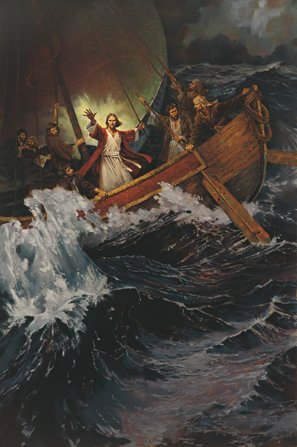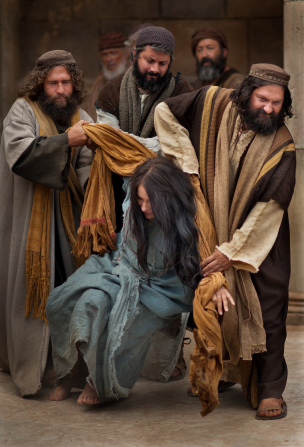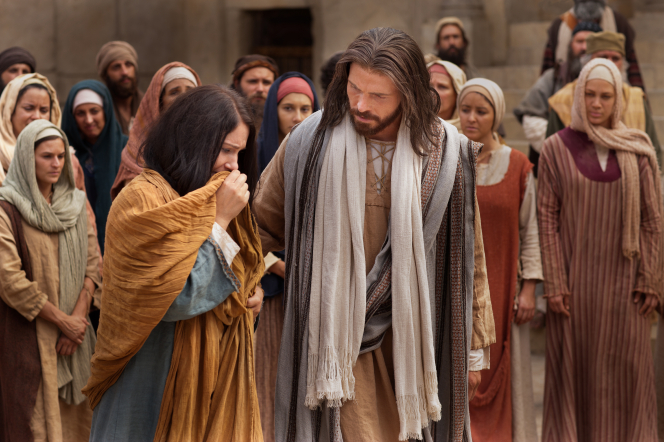Andrea began by sharing a story about an event that happened a couple of weeks ago in their home. She had set out their family nativity on a table that she frequently walked by during the day. As she was passing by the nativity one day, she noticed someone had moved the animals so that they were circled around the baby Christ figure. When she asked her children about it, Sophie admitted she had moved the animals so that they could better see the Christ child. A couple of days later, Andrea noticed all the characters in the nativity were now facing in and circled around the Christ child. Again, Sophie admitted she had moved them because she wanted to be sure EVERYONE could see the baby. Andrea was touched by the actions of her daughter who wanted Christ to be the center of the nativity and wanted to be sure everyone could see Him.
Is our life centered around Christ?
The following was shared from the lesson manual, Chapter 24:
President Ezra Taft Benson frequently quoted the Savior’s counsel to the twelve Nephite disciples: “What manner of men ought ye to be? Verily I say unto you, even as I am” (3 Nephi 27:27).
“I testify to you that there is no greater, more thrilling, and more soul-ennobling challenge than to try to learn of Christ and walk in His steps. Our model, Jesus Christ, walked this earth as ‘the Exemplar.’ He is our Advocate with the Father. He worked out the great atoning sacrifice so we could have a fullness of joy and be exalted in accordance with His grace and our repentance and righteousness. He did all things perfectly and commands that we be perfect even as He and His Father are perfect. (See 3 Ne. 12:48.)
“‘What would Jesus do?’ or ‘What would He have me do?’ are the paramount personal questions of this life. Walking in His way is the greatest achievement of life. That man or woman is most truly successful whose life most closely parallels that of the Master.”
As a class, we read 2 Peter 1:4-8. This scripture by the Apostle Peter spoke of the process by which a person can be made a partaker “of the divine nature”. This is important, for if we truly become partakers of the divine nature, we shall become like Him.
Andrea focused on 3 divine attributes of Christ: faith, patience, and kindness.

1) FAITH: Consider the beautiful account of Christ calming the storm.
What are some of the storms we face in life? (Mental health issues, family members who are inactive or struggling with their faith, financial concerns, children fighting, the world attacking sacred beliefs, etc.)
How can faith in Christ help us "calm our storms" and find peace? We must have faith in Jesus Christ. We must CHOOSE to have faith. It is a choice we make daily about where to place our trust and where to center our beliefs. It doesn't mean our storms or trials will instantly be removed but it does mean we can have firm hope that we will be successful and find ultimate peace THROUGH our trials.
2) PATIENCE: Andrea shared the story about a favorite aunt of hers that has suffered some serious trials and challenges in her life but has consistently chosen to exercise patience and faith in the Lord Jesus Christ.
From the lesson manual: "Patience is another form of self-control. It is the ability to postpone gratification and to bridle one’s passions. In his relationships with loved ones, a patient man does not engage in impetuous behavior that he will later regret. Patience is composure under stress. A patient man is understanding of others’ faults.
A patient man also waits on the Lord. We sometimes read or hear of people who seek a blessing from the Lord, then grow impatient when it does not come swiftly. Part of the divine nature is to trust in the Lord enough to “be still and know that [he is] God” (D&C 101:16).
A [person] who is patient will be tolerant of the mistakes and failings of his loved ones. Because he loves them, he will not find fault nor criticize nor blame."
3) KINDNESS: Andrea shared the following images and story from the New Testament.

The Pharisees and scribes felt very justified in their treatment of this woman who was taken in adultery. Look at their faces. When she was brought before Christ, they expected the full extent of the Law of Moses to be exercised. She deserved it. She had sinned. But look at the Savior's face.

He chose to look upon her with kindness and compassion. How can His example influence how we look upon and treat others? Do we hope Christ will look upon us with forgiveness, kindness and compassion? Should we not do the same to others?
"One who is kind is sympathetic and gentle with others. He is considerate of others’ feelings and courteous in his behavior. He has a helpful nature. Kindness pardons others’ weaknesses and faults. Kindness is extended to all—to the aged and the young, to animals, to those low of station as well as the high."
As we approach this Christmas season, may we each stop and contemplate how we can turn our lives more to the Savior. May we reach out to others and seek to alleviate their burdens through patience and kindness.